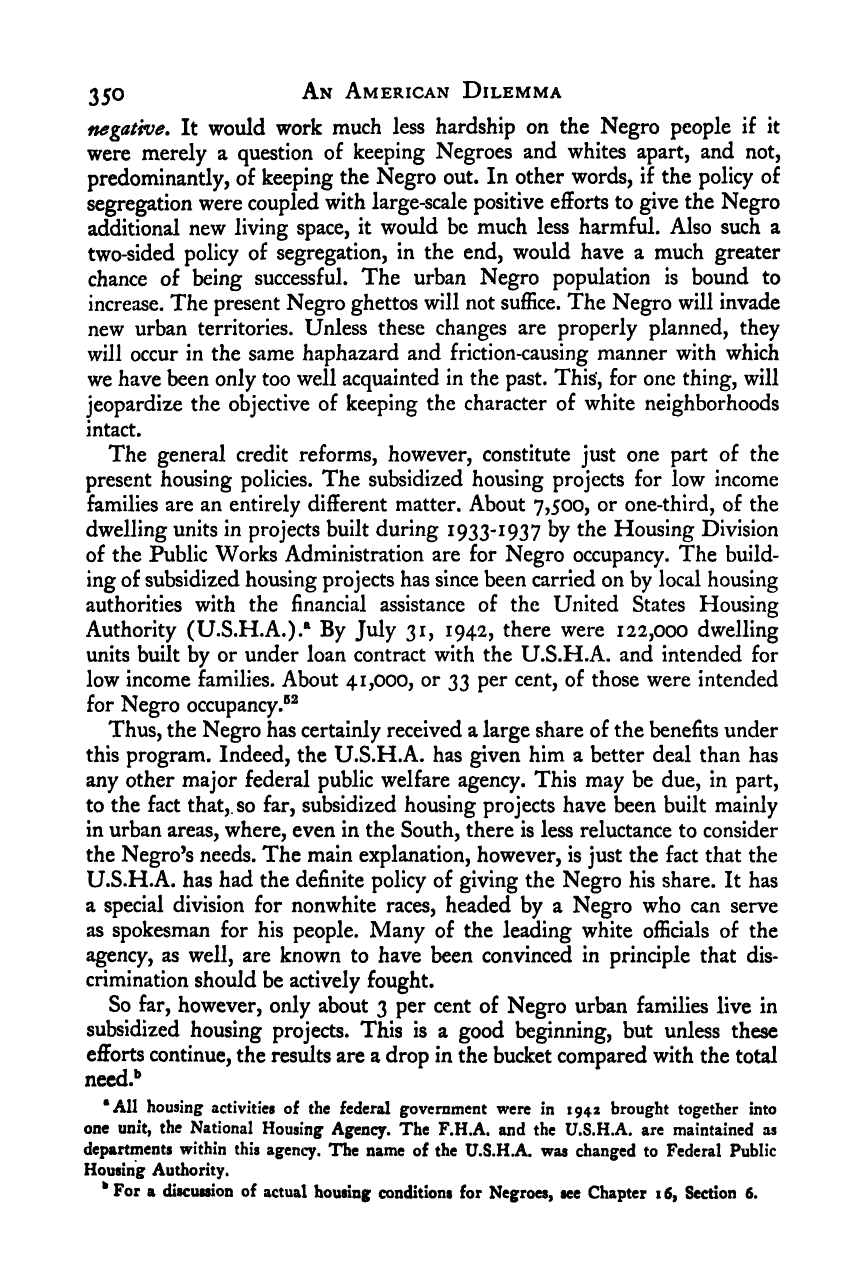Note: Gunnar Myrdal died in 1987, less than 70 years ago. Therefore, this work is protected by copyright, restricting your legal rights to reproduce it. However, you are welcome to view it on screen, as you do now. Read more about copyright.
Full resolution (TIFF) - On this page / på denna sida - IV. Economics - 15. The Negro in the Public Economy - 6. Public Housing Policies

<< prev. page << föreg. sida << >> nästa sida >> next page >>
Below is the raw OCR text
from the above scanned image.
Do you see an error? Proofread the page now!
Här nedan syns maskintolkade texten från faksimilbilden ovan.
Ser du något fel? Korrekturläs sidan nu!
This page has never been proofread. / Denna sida har aldrig korrekturlästs.
350 An American Dilemma
negative. It would work much less hardship on the Negro people if it
were merely a question of keeping Negroes and whites apart, and not,
predominantly, of keeping the Negro out. In other words, if the policy of
segregation were coupled with large-scale positive efforts to give the Negro
additional new living space, it would be much less harmful. Also such a
two-sided policy of segregation, in the end, would have a much greater
chance of being successful. The urban Negro population is bound to
increase. The present Negro ghettos will not suffice. The Negro will invade
new urban territories. Unless these changes are properly planned, they
will occur in the same haphazard and friction-causing manner with which
we have been only too well acquainted in the past. This’, for one thing, will
jeopardize the objective of keeping the character of white neighborhoods
intact.
The general credit reforms, however, constitute just one part of the
present housing policies. The subsidized housing projects for low income
families are an entirely different matter. About 7,500, or one-third, of the
dwelling units in projects built during 1933-1937 by the Housing Division
of the Public Works Administration are for Negro occupancy. The build-
ing of subsidized housing projects has since been carried on by local housing
authorities with the financial assistance of the United States Housing
Authority (U.S.H.A.).* By July 31, 1942, there were 122,000 dwelling
units built by or under loan contract with the U.S.H.A. and intended for
low income families. About 41,000, or 33 per cent, of those were intended
for Negro occupancy.®^
Thus, the Negro has certainly received a large share of the benefits under
this program. Indeed, the U.S.H.A. has given him a better deal than has
any other major federal public welfare agency. This may be due, in part,
to the fact that,, so far, subsidized housing projects have been built mainly
in urban areas, where, even in the South, there is less reluctance to consider
the Negro’s needs. The main explanation, however, is just the fact that the
U.S.H.A. has had the definite policy of giving the Negro his share. It has
a special division for nonwhite races, headed by a Negro who can serve
as spokesman for his people. Many of the leading white officials of the
agency, as well, are known to have been convinced in principle that dis-
crimination should be actively fought.
So far, however, only about 3 per cent of Negro urban families live in
subsidized housing projects. This is a good beginning, but unless these
efforts continue, the results are a drop in the bucket compared with the total
need.*^
•All housing activities of the federal government were in 1942 brought together into
one unit, the National Housing Agency. The F.H.A. and the U.S.H.A. are maintained as
departments within this agency. The name of the U.S.H.A. was changed to Federal Public
Housing Authority.
^ For a discussion of actual housing conditions for Negroes, see Chapter 1 6, Section 6.
<< prev. page << föreg. sida << >> nästa sida >> next page >>